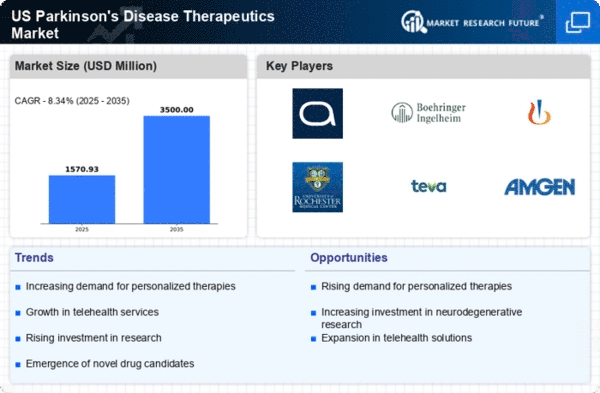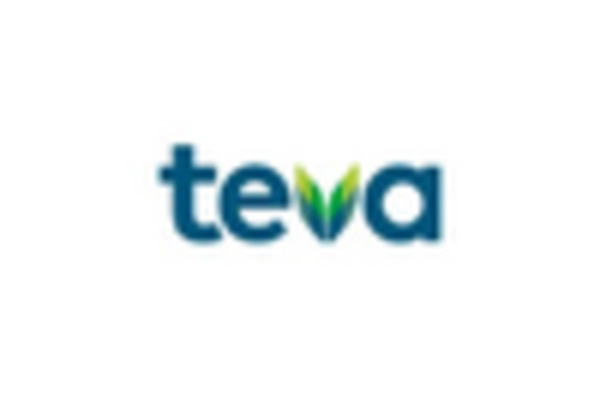Regulatory Support and Incentives
Regulatory support and incentives play a pivotal role in shaping the parkinsons disease-therapeutics market. The US Food and Drug Administration (FDA) has implemented various programs aimed at expediting the development and approval of new therapies for Parkinson's disease. Initiatives such as the Breakthrough Therapy Designation and Fast Track designation are designed to facilitate quicker access to innovative treatments. In 2025, the number of therapies receiving expedited review has increased, reflecting the regulatory body's commitment to addressing unmet medical needs. This supportive regulatory environment is likely to encourage pharmaceutical companies to invest in research and development, ultimately enhancing the therapeutic options available in the market.
Growing Investment in Biotechnology
The growing investment in biotechnology is a significant driver for the parkinsons disease-therapeutics market. Venture capital funding and public-private partnerships are increasingly directed towards biopharmaceutical companies focused on developing novel therapies for neurodegenerative diseases. In 2025, the biotechnology sector has attracted over $5 billion in investments specifically for Parkinson's disease research, indicating a robust interest in innovative treatment solutions. This influx of capital is likely to accelerate the development of cutting-edge therapeutics, including gene therapies and biologics, which may offer new hope for patients. As investment continues to rise, the parkinsons disease-therapeutics market is expected to expand, providing a wider array of treatment options.
Rising Awareness and Early Diagnosis
Rising awareness about Parkinson's disease and its symptoms is significantly impacting the parkinsons disease-therapeutics market. Educational campaigns and advocacy efforts have led to increased recognition of the disease, facilitating earlier diagnosis and intervention. Early diagnosis is crucial, as it allows for timely therapeutic intervention, which can potentially slow disease progression. In 2025, it is estimated that early diagnosis initiatives have contributed to a 20% increase in diagnosed cases, leading to a corresponding rise in demand for therapeutics. This heightened awareness not only benefits patients but also encourages healthcare providers to prioritize treatment options, thereby stimulating market growth.
Advancements in Research and Development
Ongoing advancements in research and development are crucial for the evolution of the parkinsons disease-therapeutics market. Increased funding from both public and private sectors has led to a surge in clinical trials and innovative treatment modalities. For instance, the National Institutes of Health (NIH) has allocated substantial resources towards understanding the pathophysiology of Parkinson's disease, which has resulted in the identification of new therapeutic targets. In 2025, the market is witnessing a notable increase in the number of investigational drugs, with over 50 compounds currently in various stages of clinical trials. This influx of research is likely to enhance the therapeutic landscape, offering hope for improved patient outcomes and driving market expansion.
Aging Population and Increased Incidence
The aging population in the US is a significant driver for the parkinsons disease-therapeutics market. As individuals age, the risk of developing neurodegenerative disorders, including Parkinson's disease, escalates. Current estimates suggest that approximately 1 million people in the US are living with Parkinson's disease, a figure that is projected to rise as the population ages. This demographic shift is likely to increase the demand for effective therapeutics, thereby propelling market growth. Furthermore, the prevalence of Parkinson's disease is expected to double by 2040, indicating a pressing need for innovative treatment options. The parkinsons disease-therapeutics market must adapt to this growing patient population, focusing on developing therapies that cater to the unique needs of older adults.
















